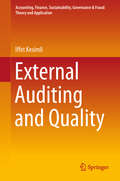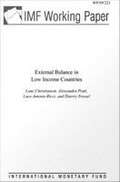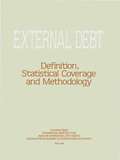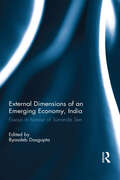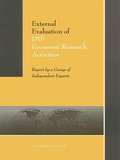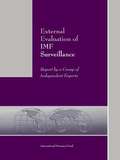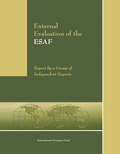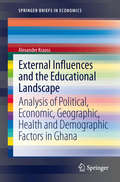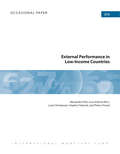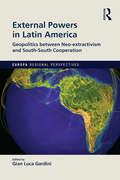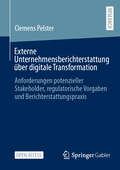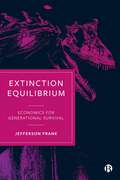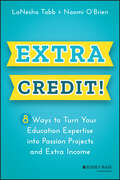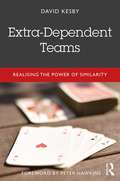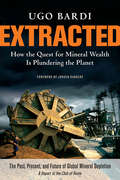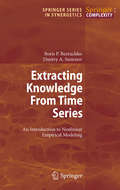- Table View
- List View
External Auditing and Quality (Accounting, Finance, Sustainability, Governance & Fraud: Theory and Application)
by Iffet KesimliThis book focuses on factors impacting audit quality, and solutions to these problems. In addition to elaborating on legislation in the European Union and United States, the book also provides a thorough outlook of Turkish audit market from the point of view of auditing firms and their clients. Many cases and samples are provided to assist practitioners to successfully re-engineer organizational structures in accordance with fresh regulations and expectations of the market. This book serves as a helpful resource for auditing firms, auditors, regulating authorities, as well as post-graduate students of audit sector.
External Balance in Low Income Countries
by Alessandro Prati Luca Antonio Ricci Lone Christiansen Thierry TresselA report from the International Monetary Fund.
External Debt Sustainability in HIPC Completion Point Countries: An Update
by Jie Yang Dan NybergA report from the International Monetary Fund.
External Debt and Growth
by Hélène Poirson Catherine Pattillo Luca RicciA report from the International Monetary Fund.
External Dimension of an Emerging Economy, India: Essays in Honour of Sunanda Sen
by Byasdeb DasguptaThis book offers an analysis of external dimensions of an emerging economy, India, in the backdrop of neoliberal globalisation. External dimensions of Indian economy signify her inter-relation with the rest of the world in terms of trade and financial flows and how that affects the development process within the country in the age of neoliberal globalisation. It is based on non-mainstream unorthodox approach in Economics and as such is a critique of the mainstream neoclassical position on current neoliberal globalisation. The contents of the book can be classified into as follows – (1) India’s external dimension in the colonial period through the trade route ; (2) concerns with India’s balance of payments transactions in terms of illegal flows, (3) political economy of development planning in the present era of globalisation, (4) capital flows as it affect the India’s external front, (5) Indian industries under the TRIPs regime, (6) regional economic integration of India and (7) foreign capital flows in India during the liberalisation period. The entire book is an attempt to decipher the meaning and significance the process of globalisation produces for the real economy of India. The uniqueness of the book is that in one place one can find different unorthodox positions dealing with the external dimensions of emerging India, which cannot be found in any other book.
External Evaluation of IMF Economic Research Activities
by International Monetary FundThis report evaluates the IMF's economic research activities and whether they contribute successfully to the objectives of the organisation. It considers five basic issues central to the research process which relate to: organisational structure, culture, incentives and accountability, resource allocation and dissemination. The report concludes that there is room for improvement, and makes a number of recommendations which include setting priorities for research activities, and improving incentives and accountability in the research process.
External Evaluation of IMF surveillance
by International Monetary FundAn external evaluation of IMF surveillance over members' policies. Much of the research centred on the Fund's surveillance over the last decade of a sample of twelve countries: Brazil, Chile, China, the Czech Republic, India, Japan, Korea, Saudi Arabia, South Africa, Sweden, Thailand and the United States. The key recommendation was that surveillance should focus as much as possible on the core issues of exchange rate policy and directly associated macroeconomic policies, rather than structural issues of a non-financial nature. Doubts were raised as to the Fund's capacity to deal adequately with such issues and there were concerns that this expansion of coverage detracted from the effectiveness of surveillance overall. The international implications of policies should also be given significantly greater attention. Responses to the report by the Managing Director of IMF and by other IMF directors are included.
External Evaluation of the Esaf
by International Monetary Fund#Includes bibliographical references (p. ).
External Finance, Sudden Stops, and Financial Crisis: What is Different This Time?
by D. Filiz Unsal F. Gulcin OzkanA report from the International Monetary Fund.
External Influences and the Educational Landscape
by Alexander KraussWhile the analysis is not the first to investigate empirically the effects of different individual or household factors on school access and completion of Ghanaians, it extends previous work by simultaneously incorporating individual, household, community, regional and national characteristics and also illustrates the latest evidence by applying international data sources and unusually detailed household survey data for a sub-Saharan country. Its focus is threefold: (i) gaining a richer understanding of which external influences hinder educational access and attainment in Ghana, (ii) how to better tackle these challenges and (iii) analyzing how educational development affects the country's overall development. An interview with the Minister of Education helps guide the policy orientation of the analysis by identifying several critical challenges and areas of needed policy attention. Findings from the data analysis indicate that the geographic divide between the North and South, increased economic growth, demographic pressure and a number of individual, household and community factors especially children's nutritional and labour status are the most important challenges in increasing levels of education among Ghanaians in years to come. Finally, the analysis pilots a new and comprehensive results- and capacity-focused policy matrix to help the Government of Ghana realign policy priorities and reform existing programs. To this end, respective policy levers on the demand- and supply-side are discussed, with particular reference to external and demand-side interventions which have not received the necessary attention at the policy-level to improve educational opportunities and outcomes at all levels.
External Performance in Low-Income Countries
by Alessandro Prati Luca Antonio Ricci Lone Christiansen Stephen Tokarick Thierry TresselAssessments of exchange rate misalignments and external imbalances for low-income countries are challenging because methodologies developed for advanced and emerging economies cannot be automatically applied to poorer nations. This paper uses a large database, unique in the set of indicators and number of countries it covers, to estimate the relationship in low-income countries between a set of fundamentals in the medium to long term and the real effective exchange rate, the current account, and the net external assets position.
External Powers in Latin America: Geopolitics between Neo-extractivism and South-South Cooperation (Europa Regional Perspectives)
by Gian Luca GardiniThis book examines the role of external powers in Latin America in the 21st century. Non-traditional partners have significantly increased their political and economic engagement with the continent. Five key questions arise: why has this surge taken place; when has it happened; in which regions and sectors is it mostly felt; what is the Latin American perspective; and what are the actual results? The book analyses 16 case studies: the United States, the European Union, China, Russia, Japan, Canada, India, Turkey, Iran, Israel, South Korea, Taiwan, Indonesia, the ASEAN countries, South Africa and Australia. The spectrum of existing explanations in the literature spans from neo-extractivism to South-South cooperation. This volume places them in context and proposes a more multifaceted approach, stressing a combination of systemic factors and internal dynamics both in Latin America and in the external partner countries. Geopolitics still matters and so do nation states, their interests and leaders. Ultimately, this surge in engagement has largely reproduced past patterns. Are new partners that different from the old ones?
Externe Unternehmensberichterstattung über digitale Transformation: Anforderungen potenzieller Stakeholder, regulatorische Vorgaben und Berichterstattungspraxis
by Clemens PelsterIn diesem Open Access-Buch wird auf Grundlage der Anforderungen potenzieller Stakeholder, der bestehenden regulatorischen Vorgaben und des Status quo der externen Unternehmensberichterstattung über digitale Transformation ein innovatives Berichtskonzept entwickelt, welches Berichterstellern eine Hilfestellung bietet, die Entscheidungsnützlichkeit ihrer externen Unternehmensberichterstattung zu erhöhen. Digitale Transformation ist eines der Megathemen unserer heutigen Zeit und kann entscheidend für den Erfolg und Fortbestand von Unternehmen sein. Dementsprechend ist i. S. d. Stakeholder- und der Agency-Theorie davon auszugehen, dass sowohl die externen Stakeholder als auch das Management eines Unternehmens ein Interesse an der Veröffentlichung diesbezüglicher Informationen haben, um die Erreichung ihrer persönlichen Ziele beurteilen zu können und schließlich den Fortbestand des Unternehmens zu sichern. Explizite Vorgaben oder Empfehlungen zur externen Unternehmensberichterstattung über digitale Transformation gab es bisher nicht. Die bis dato unerforschten Anforderungen von Stakeholdern an eine solche Berichterstattung sowie die nur unzureichend erforschte Berichterstattungspraxis stellten Unternehmen darüber hinaus vor die Herausforderung, diesbezüglich entscheidungsnützliche Informationen zu berichten.
Externe Unternehmensrechnung
by Ralf Ewert Alfred Wagenhofer Georg SchneiderDie externe Unternehmensrechnung befasst sich mit der konzeptionellen Gestaltung und den Einsatzbedingungen von Informationssystemen, die an externe Adressaten wie Investoren, Kreditgeber, Arbeitnehmer, Geschäftspartner und die Öffentlichkeit gerichtet sind. Sie umfasst die Rechnungslegung, hier vor allem Jahresabschlüsse, sowie weitere verpflichtende und freiwillige Finanzberichterstattung.Im Mittelpunkt dieses Lehrbuches stehen Konzeptionen, Strukturen und Anreizeffekte der Rechnungslegung, die dem Verständnis der ökonomischen Wirkungen vorherrschender Institutionen dienen. Methodisch stehen informationsökonomische Ansätze und internationale empirische Studien im Vordergrund.Als spezifische Themen werden die Informationsfunktion und Kapitalmarktwirkung der Rechnungslegung, Ausschüttungsbemessung, Bilanzierung und Bewertung, Vorsicht, Fair Values, Bilanzpolitik, Publizität und Wirtschaftsprüfung umfassend behandelt. Die vierte Auflage beinhaltet eine umfangreiche Aktualisierung sowohl der im Detail behandelten Themen, des regulatorischen Umfelds als auch der Literatur.
Extinction Equilibrium: Economics for Generational Survival
by Jefferson FrankGeneration Z has grown up with a global financial crisis, a pandemic, the climate emergency, growing autocracy and wars. Survival, not just equity, is at stake. As debate rages about how to ensure a fairer and sustainable society, this book challenges short-sighted economic policies, asking where we want to be in 20 years’ time and how we might get there. Offering fresh, and sometimes counterintuitive, thinking on a range of economic issues including monetary policy, housing and university funding, it argues in favour of policy guardrails to protect the future, higher interest rates, and a burst of inflation. Robots and AI should be seen as positive replacements for population growth. This is an original, readable and entertaining take on how we can change course before it is too late.
Extinction Governance, Finance and Accounting: Implementing a Species Protection Action Plan for the Financial Markets
by Jill AtkinsThe planet is currently experiencing a mass extinction event, with human and business activity being the root cause of species loss and habitat destruction. Industries, companies, banks, investors, accountants and auditors have all played their role. This book explores how they can also provide a solution. The book presents plans, metrics, frameworks, mechanisms and financial innovations that can be, and are being, implemented through the financial markets in order to save and protect species, enhance biodiversity and, at the same time, preserve the financial markets and the business world. This biodiversity handbook addresses the intersection between species extinction and the global capitalist system. With contributions from leading non-governmental organisations such as the Capitals Coalition, Business for Nature, the Ecojustice Foundation, ShareAction and the Endangered Wildlife Trust, plus senior researchers in the field, as well as industry experts from Moody’s, EOS at Hermes Federated Investment Management, BlueBay Asset Management, ODDO BHF Asset Management and OSSIAM (to mention just a few), this book is at the forefront of addressing the crucially important topics of extinction accounting, finance and governance. Drawing on leading research, the book is written in an accessible style and is relevant to researchers and students in the fields of sustainability, governance, accounting, finance, corporate social responsibility and corporate governance. It is essential reading for investors, responsible investors, bankers, business leaders and policy makers in the field of sustainable financial markets. Given the interdisciplinary nature of this book, it is useful to conservationists, ecologists and others involved in species and biodiversity protection.
Extinguish Burnout: A Practical Guide to Prevention and Recovery
by Terri Bogue Rob BogueBurnout can leave you feeling stuck, exhausted, and powerless but there is a path out. Extinguish Burnout is a clear, compassionate and research-informed guide to understanding what drives burnout and how to overcome it. Authors Rob and Terri Bogue offer readers practical tools and short, actionable chapters that can be easily digested even in moments of overwhelm. From improving self-talk and building resilience to asking for support and setting realistic expectations, this book transforms abstract well-being concepts into daily habits that restore energy and hope.· What causes burnout and how to escape· How to more realistically value the results you're getting· When to ask for and receive more support· What four simple physical self-care activities reduce burnout· How to change your self-talk for the better· What to do to manage your demands so you're not so exhausted· How to better recognize your personal value· How to integrate your self-image and reduce your stress· How to identify and eliminate barriers to your efficacy· How to build resilience against setbacks· Why hope is essential· Why failure isn't final· How to be detached without being disengaged Ideal for anyone feeling worn down by work or life, it provides the insight and encouragement needed to move from surviving to thriving.
Extra Credit!: 8 Ways to Turn Your Education Expertise into Passion Projects and Extra Income
by LaNesha Tabb Naomi O'BrienLearn to package your professional skill, monetize your interests, and share your teaching gifts with the world In Extra Credit! 8 Ways to Turn Your Education Expertise into Passion Projects and Extra Income, a team of accomplished educators and content creators delivers an illuminating and engaging handbook for educators who seek to bring in extra income with their professional and personal talents. In the book, you&’ll explore a wide variety of potential income streams, including leveraging social media platforms, creating educational resources, writing, and online courses, just to name a few! You&’ll also find out how educators are finding purpose and meaning in their various side hustles, making profitable and beneficial use of their many gifts. You&’ll discover: Outlets for your passion for teaching that go beyond the classroom and tap into new and exciting markets Strategies for monetizing your interests and hobbies to create impressive and diverse income streams Exciting ways to contribute to education that aren&’t limited to teaching in the classroom, like merchandising, professional development workshops, and resource creationAn essential read for professors, teachers, teaching assistants, and other educators, Extra Credit! will earn a place in the libraries of school administrators, former educators, and other school based professionals.
Extra Mile: 500 Customer Service Tips for Success: Tools to Attract, Satisfy, & Retain Even the Most Difficult Customer
by Tycho PressThe Comprehensive Guide to Customer Service For The 21st Century Even the most successful companies need their customers happy and to keep coming back for more. Whether you re just starting your business and want to lock up great customer service procedures, or you re an established company looking to revamp your customer service to answer new market needs, Extra Mile is the resource for you. Unlike other books that are brimming with irrelevant and outdated information, Extra Mile offers: 500 essential tips, including: Real-Life Scenarios, Crisis Management, and Building Customer Loyalty Intel into the customer service secrets of business giants, such as American Express, Southwest Airlines, and Ritz-Carlton Hotels A section dedicated to providing excellent customer service online A list of 50 Things Never to Do, to help avoid conflict and negative reviews Get ahead of the pack by learning how great customer service equals customer retention. "
Extra! Extra! Newsboys Strike!
by Barbara KrasnerDo you know what a newsboy is? They were young boys who sold newspapers in the 1800s. Learn the history of the group of children who striked against newspaper moguls to improve their jobs.
Extra-Dependent Teams: Realising the Power of Similarity
by David KesbyInter-Dependent Teams: people working together to achieve a common goal. Extra-Dependent Teams: people learning together to develop a common practice. Extra-Dependent Teams: Realising the Power of Similarity reframes the conventional mental model of teams into two complementary mental models of Extra-Dependent and Inter-Dependent Teams. Both types of team operate inside organisations today, but convention doesn’t realise their difference. Extra-Dependent Teams are present in organisations because of their similarity – they do similar work in similar ways, but don’t actually work together. People who lead them often feel like they are herding cats. Convention cites them as dysfunctional. But cats don’t herd. They are independent whilst all being the same. Realising this difference provides new ways of understanding and addressing the problems that convention can’t overcome. The reader will be introduced to the distinctness of Extra-Dependent Teams, their dynamics, how they perform, how they develop and how to lead them. Inspired by research on communities of practice and social identity, the book delivers an original and pragmatic approach to teams, being packed with examples, case studies, practical guidance and words of warning for managers and others about how to transform their Extra-Dependent Teams from peripheral problems into engines of innovation and growth.
Extracted
by Jorgen Randers Ugo BardiAs we dig, drill, and excavate to unearth the planet's mineral bounty, the resources we exploit from ores, veins, seams, and wells are gradually becoming exhausted. Mineral treasures that took millions, or even billions, of years to form are now being squandered in just centuries-or sometimes just decades. Will there come a time when we actually run out of minerals? Debates already soar over how we are going to obtain energy without oil, coal, and gas. But what about the other mineral losses we face? Without metals, and semiconductors, how are we going to keep our industrial system running? Without mineral fertilizers and fuels, how are we going to produce the food we need?Ugo Bardi delivers a sweeping history of the mining industry, starting with its humble beginning when our early ancestors started digging underground to find the stones they needed for their tools. He traces the links between mineral riches and empires, wars, and civilizations, and shows how mining in its various forms came to be one of the largest global industries. He also illustrates how the gigantic mining machine is now starting to show signs of difficulties. The easy mineral resources, the least expensive to extract and process, have been mostly exploited and depleted. There are plenty of minerals left to extract, but at higher costs and with increasing difficulties.The effects of depletion take different forms and one may be the economic crisis that is gripping the world system. And depletion is not the only problem. Mining has a dark side-pollution-that takes many forms and delivers many consequences, including climate change. The world we have been accustomed to, so far, was based on cheap mineral resources and on the ability of the ecosystem to absorb pollution without generating damage to human beings. Both conditions are rapidly disappearing. Having thoroughly plundered planet Earth, we are entering a new world. Bardi draws upon the world's leading minerals experts to offer a compelling glimpse into that new world ahead.
Extracting Insight from Experience: Becoming a More Effective Leader
by Robert J. ThomasThis chapter explores the role of crucibles-experiences that lead to a new or altered sense of identity-in the education of a leader, illustrating how crucibles often offer lessons in both leadership and learning.
Extracting Knowledge From Time Series: An Introduction to Nonlinear Empirical Modeling
by Boris P. Bezruchko Dmitry A. SmirnovThis book addresses the fundamental question of how to construct mathematical models for the evolution of dynamical systems from experimentally-obtained time series. It places emphasis on chaotic signals and nonlinear modeling and discusses different approaches to the forecast of future system evolution. In particular, it teaches readers how to construct difference and differential model equations depending on the amount of a priori information that is available on the system in addition to the experimental data sets. This book will benefit graduate students and researchers from all natural sciences who seek a self-contained and thorough introduction to this subject.
